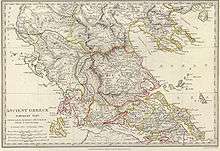Perrhaebi
The Perrhaebi (Greek: Περραιβοί) were an ancient Greek people[1][2] who lived on the western slopes of Olympus, on the border between Thessaly and Macedonia.[3] They took part in the Trojan War under Guneus and also fought in the Battle of Thermopylae.

Geography
Most of their country was mountainous and sparsely inhabited.[4] Their principal towns were Phalanna, situated in fertile plains, and Oloosson, the tribal capital.[4]
History
Still independent at the time of the Iliad, they were tributary períoikoi to the neighbouring Thessali in the 5th century BC, with a special dependence upon the city of Larisa. They could, however, enjoy some degree of autonomy whenever the Thessalian League was weaker, and they had retained from their independence two votes in the Delphic Amphictyonic League (Amphiktyonía), until Philip II of Macedon took one vote from them. They were part of the Macedonian Kingdom until the Roman conquest by Titus Quinctius Flamininus in 196 BC.[3][4]
They were listed in Xerxes' vast army by Herodotus.[5] A coin of the Perrhaebi depicted a man restraining a bull on one side and a horse on the other. The inscription was "Περραιβών".[6]
References
- Phang, Sara E.; Ph.D, Iain Spence; Ph.D, Douglas Kelly; Ph.D, Peter Londey (2016). Conflict in Ancient Greece and Rome: The Definitive Political, Social, and Military Encyclopedia [3 volumes]: The Definitive Political, Social, and Military Encyclopedia. ABC-CLIO. ISBN 978-1-61069-020-1.
Delphic Amphictyony... The orignial ethne were... Perrhaebians... all from mainland Greece
- The Oxford Classical Dictionary by Simon Hornblower and Antony Spawforth, 2003, ISBN 0-19-860641-9, page 1142, "Perhhaebi , a tribe occupying a district on the northern border of Thessaly and commanding passes from Macedonia. Although most of their country was mountainous and sparsely inhabited their principal towns Olooson the tribal capital and Phalanna were situated in fertile plains. Neither however played any significant role in history. The Perrhaebi who had been thrust northwards by the invading Thessalians were reduced to the status of perioikoi..."
- Errington, Robert M. (2006). "Perrhaebi". Brill’s New Pauly. doi:10.1163/1574-9347_bnp_e914870.
- Westlake, Henry Dickinson; Hornblower, Simon (2016), "Perrhaebi", Oxford Research Encyclopedia of Classics, Oxford University Press, doi:10.1093/acrefore/9780199381135.013.4877, ISBN 978-0-19-938113-5, retrieved 2020-05-31
- Herodotus, The Histories, 7.185.1, CLXXXV. I must, however, also take into account the force brought from Europe, and I will rely on my best judgment in doing so. The Greeks of Thrace and the islands off Thrace furnished one hundred and twenty ships, and the companies of these ships must then have consisted of twenty-four thousand men. [2] As regards the land army supplied by all the nations--Thracians, Paeonians, Eordi, Bottiaei, Chalcidians, Brygi, Pierians, Macedonians, Perrhaebi, Enienes, Dolopes, Magnesians, Achaeans, dwellers on the coast of Thrace--of all these I suppose the number to have been three hundred thousand. [3] When these numbers are added to the numbers from Asia, the sum total of fighting men is two million, six hundred and forty-one thousand, six hundred and ten.
- Handbook of Ancient Greek and Roman Coins: An Official Whitman Guidebook by Zander H. Klawans and K. E. Bressett, 1995, ISBN 0-307-09362-X, page 104, "... Horse r1EPPAIBQN A tribe which occupied a section 480-400 B.C. Perrhaebi of Thessaly in Greece ..."
- Westlake, Henry Dickinson and Hornblower, Simon. "Perrhaebi" in The Oxford Classical Dictionary. London: OUP, 2003. p. 1142.